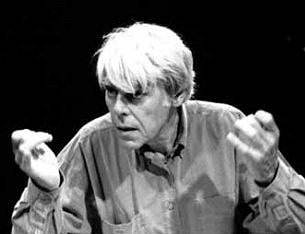S & H Concert Review
Beethoven Concert,
Andreas Haefliger (piano), Frank Peter Zimmermann (violin), Heinrich Schiff
(cello), Philharmonia Orchestra, Franz Brüggen (conductor), Royal
Festival Hall, 1st December 2002 (AR)
BEETHOVEN: Overture Coriolan
BEETHOVEN: Triple Concerto
BEETHOVEN: Symphony No. 7This concert seemed cursed from the beginning: not only did the originally scheduled conductor, veteran Wolfgang Sawallisch, cancel due to illness, but the substitute, Franz Brüggen, had every appearance of not being well enough to take his place. He seemed barely present, and physically the conductor looked too frail to undertake the enormous demands imposed by this all-Beethoven programme.
As he made his way towards the podium he was a living-dead ringer for Nosferatu: he looked gaunt and cadaverous, with his shoulder blades sticking out like wings and his head bent far forward, all but buried in his chest. He conducted with hands shaped like clutching claws. Unfortunately, his bloodless appearance was reflected by the anaemic playing of the Philharmonia Orchestra, who were clearly inadequately rehearsed.
Brüggen opted for a quasi ‘period’ style of playing, with a modern symphony orchestra using modern instruments but with a reduced string section, eschewing vibrato in the strings and horns. This hybrid style combining period and modern elements didn’t come off at all: moreover, the lean sound of the reduced strings made all three compositions far too light-weight and lacking in tension.
In reviewing Philharmonia concerts before I have stressed that their ‘cellos and double basses are chronically undernourished. However, under the Brüggen ‘lean period style’ this fault was even more noticeable and ’the Philharmonia’s skeletal string section (a mere five double basses for Beethoven) could scarcely be heard at all; mere murmurs were all that came through, and I was sitting relatively near them.
The concert opened with an uninspired performance of Beethoven’s Coriolan Overture; the strings lacked an incisive bite, the woodwind were too laid back, as were the horns, and the timpanist was too thumpy. The closing passages were seriously marred by a chorus of very loud coughs, appropriate nails hammered into the coffin of this dead performance.
Brüggen's period approach to Beethoven’s Triple Concerto was a conceptual disaster running against the grain of his three soloists’ more late romantic, almost nineteenth century, style of playing. Frank Peter Zimmermann and Heinrich Schiff played with great verve and seemed to be playing a spirited duet, watching each other closely, while Andreas Haefliger, having his back to them, just did his own thing, ignoring his fellow soloists and conductor altogether. All three soloists played with a wealth of feeling and style, only serving to emphasise the pallid playing of the orchestra.
While Brüggen kept religiously to the score, with all the correct tempi, he got a listless response from the orchestra which sounded desultory in the background; and they displayed no real dialogue with the soloists. The opening double basses of the first movement were barely audible and consequently lacking in dramatic weight. Haefliger produced some exquisite playing in the Largo only to be let down by a dull, almost non-existent, ‘cello accompaniment. Throughout this performance the Philharmonia sounded etiolated and unengaged.
Brüggen showed some sign of life in the first movement (Poco sostenuto – Vivace) of Beethoven’s 7th Symphony, which was very well paced and phrased, but let down again in the closing passages with the ‘cellos and double basses having absolutely no grit or weight, and horns and woodwind opaque and recessed. Throughout this overtly brazen movement the woodwind, brass, and timpani were constantly muffled.
While the second movement (Allegretto) opened with a well judged ghostly pianissimo, the reduced body of strings sounded so thin that one could barely hear anything; the tension was slack, textures were blurred and dynamics flattened out. The third movement (Presto – Assai meno presto) fell apart with dozens of rhythmic inaccuracies even more smudging of textures and late entries, and the horns were not nearly prominent enough.
The fourth movement (Allegro con brio) was even more rhythmically flat: in the transitional passages the conductor adopted a grotesque decrescendo and deceleration in the strings which sounded contrary to what the composer wanted. And at another transitional point the timpanist got lost in a cul-de-sac, making a massive late entry with a timpani flourish and as he tried to cover it up it he was left playing solo! (This was not, by the way, a newly discovered timpani emendation of a lost Beethoven score of the 7th Symphony). The important string exchanges in the coda of the finale counted for nothing, with the essential grinding and pulsating double basses largely absent.
The strange paradox about this quasi-period interpretation with the Philharmonia was that it ended up sounding like a Karajan or Guilini performance: a homogenised streamlined sound, with recessed brass and woodwind devoid of bite, grain and dissonance. Richard Wagner said of Beethoven’s 7th Symphony: "This symphony is the very apotheosis of the dance." None of this was obvious from Brüggen’s static and effete performance which was devoid of rhythm and elan, and would have had Terpsichore in tears.
Otto Klemperer’s granite-like concert performances of Beethoven’s 7th Symphony with the NDR Symphony Orchestra (28 Sept. 1955); the Philharmonia Orchestra (2 June 1960) and the Philadelphia Orchestra (20th October 1962) illustrate the vital importance of weighty double basses, forward thrusting horns, pronounced and pointed woodwind and solid, firm timpani: elements absent from Brüggen’s account.
This fated concert showed no real rapport between Brüggen and the Phlharmonia. It seems the conductor needed much more rehearsal time for a concert that never should have been. It was a depressing evening for Brüggen who has made many innovative recordings. The Philharmonia can be a fine orchestra, and deserved better than this. Basically, this was little short of a disaster.
Alex Russell

 Return to:
Return to: